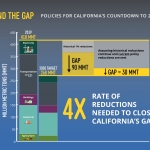California Must Accelerate Actions Now to Meet 2030 Emissions Reduction Goal

Edison partners with the state and others in working to reduce emissions across all sectors of the economy
ROSEMEAD, Calif.–(BUSINESS WIRE)–For California to meet its 2030 (and 2045) decarbonization goals, it must quadruple its annual rate of greenhouse gas reductions by adopting market-transforming policies within the next one to two years. This is according to “Mind the Gap: Policies for California’s Countdown to 2030,” a new paper published by Edison International.
“California is already experiencing the accelerating and compounding effects of climate change,” said Pedro J. Pizarro, president and CEO of Edison International. “Not only must public policy address the uncertainty and risk inherent in climate change, it must be reframed to redress historical, present and future inequities, such as the greater impact climate change is having on low-income residents and communities of color. This has significant implications for planning, funding needs, funding mechanisms and program and project execution. At Edison, we will continue working in partnership with the state and federal governments and with other stakeholders, including the communities we serve, to advance policies.”
Previous papers from Southern California Edison, Edison International’s utility subsidiary, identified an achievable and affordable route to realize California’s 2030 and 2045 greenhouse gas reduction goals by dramatically increasing renewable energy and storage, using that clean energy to electrify other sectors like transportation and buildings, employing low-carbon fuels like clean hydrogen for hard-to-electrify applications and using carbon capture.
“Mind the Gap: Policies for California’s Countdown to 2030” is Edison International’s analysis of the policy changes and additions needed to ensure that California meets its 2030 greenhouse gas (GHG) reduction goal — a reduction vital for the state to ultimately achieve its goal to decarbonize its economy by 2045.
California has been reducing GHG emissions by an average of 1% per year since 2005, which is notable given California’s economy has grown 3% per year over the same period. To meet its 2030 goal, however, the reduction must rise to 4.1% each year through 2030. The reductions resulting from current policies, even if successfully implemented, will fall short of the 2030 target by about 30 million metric tons.
“Our paper discusses where the state has made progress and which additional actions are needed now to meet California’s 2030 goals,” said Pizarro. “We provide specific state and federal policy recommendations for closing the gaps in critical areas: decarbonizing the power supply; preparing the grid for shifts in usage and increasing demands; and efficiently electrifying transportation and buildings.”
“The electric sector has made significant progress in reducing GHG emissions, reducing its share over 40% since 2005,” said Erica Bowman, director of the Edison International CEO’s Office and principal author of the policy paper. “However, decarbonization requires GHG emissions reductions across all sectors of the economy. Federal and state policies are needed to continue the progress of the electric sector and accelerate the electrification of other sectors and to ensure the reliability and resilience of the grid. These include policies that support sufficient transmission infrastructure to interconnect renewable resources as well as adequate distribution infrastructure.”
In contrast, GHG emissions from the transportation sector have been increasing since 2013 and remain California’s biggest decarbonization challenge. While electric vehicle (EV) sales in California have outpaced the national average and trends point to increasingly favorable economics for electric vehicles, additional incentives for EV purchases and charging infrastructure will be needed. On the current trajectory, California will fall short by 60% for transportation electrification and more than 50% for residential building electrification in 2030.
Most building decarbonization assessments confirm the electrification of buildings represents a significant, cost-effective opportunity to reduce GHG emissions both in the near and long terms. Edison International’s internal analysis concludes that the current trajectory of programs and policies supporting building electrification is insufficient to achieve California’s GHG emissions target.
“There is also a crucial role for the federal government to play, especially in helping create functioning markets that support the affordable electrification of key sectors,” Bowman added. “Substantial capital must be deployed throughout the country if the U.S. is going to meet the Nationally Determined Contribution goal of 50%-52% economywide emission reductions by 2030.”
The decarbonization actions needed for California to meet its 2030 goals are no exception to this capital need. Additionally, these capital investments in renewable electricity, efficient buildings and electric vehicles offset substantial annual fossil fuels and maintenance costs.
“We believe the role of utility companies is to work in close partnership with our state’s policymakers and regulatory bodies to develop and implement the necessary structures and conditions to support the successful, equitable and affordable transition to a clean-energy economy,” Pizarro said. “This will require greater funding, improving, clarifying and harmonizing goals, standards, planning and approaches to how the transition takes place and how quickly.”
“Mind the Gap: Policies for California’s Countdown to 2030” is available at edison.com/MindtheGap.
About Edison International
Edison International (NYSE: EIX) is one of the nation’s largest electric utility holding companies, providing clean and reliable energy and energy services through its independent companies. Headquartered in Rosemead, California, Edison International is the parent company of Southern California Edison Company, a utility that delivers electricity to 15 million people across Southern, Central and Coastal California. Edison International is also the parent company of Edison Energy, a global energy advisory company delivering comprehensive, data-driven energy solutions to commercial and industrial users to meet their cost, sustainability and risk goals.
Contacts
Media Contact: Jeff Monford, (626) 476-8120

